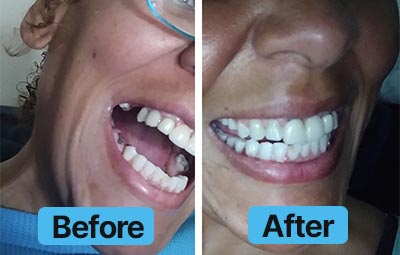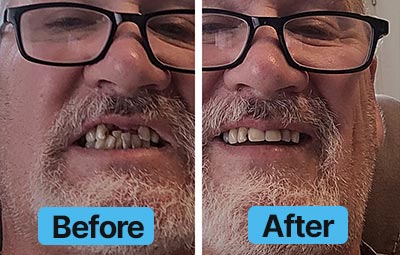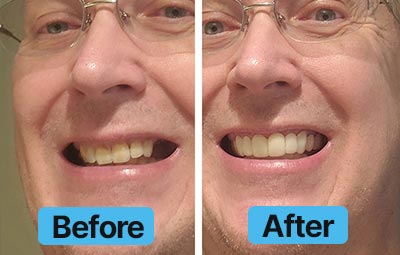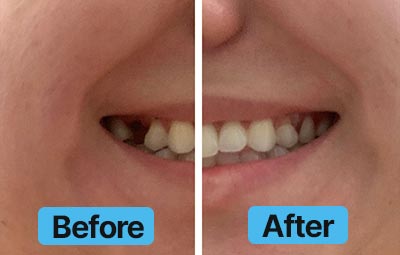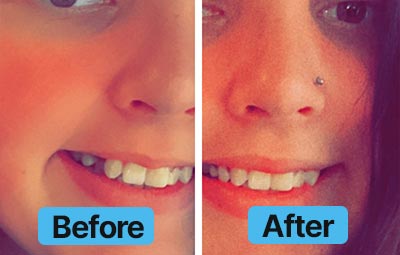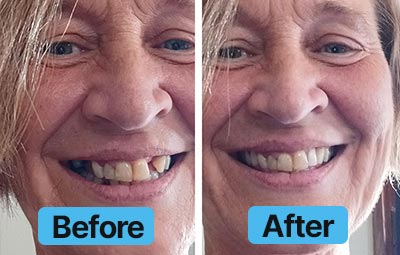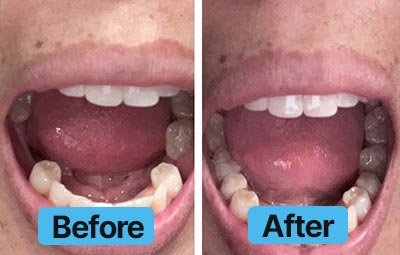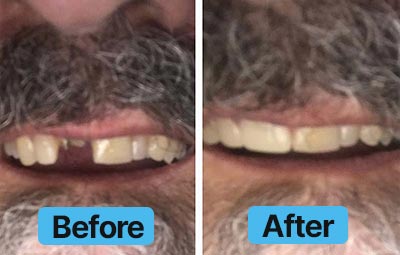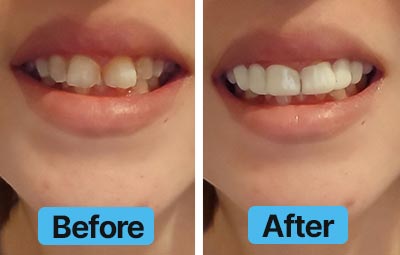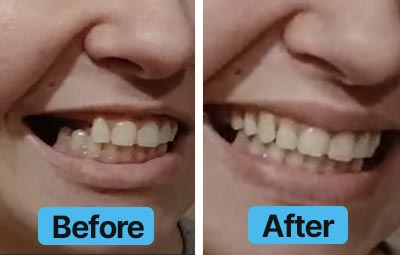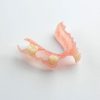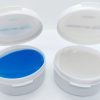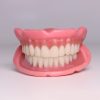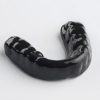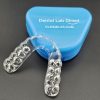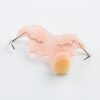Denture problems are frustrating—slipping, rubbing, making chewing harder than it should be. Some even cause infections!
So if your gums feel raw (or eating feels difficult), you’re not imagining it. Badly fitted or poorly maintained dentures can cause a ton of issues.
Why does this hurt? How do you fix it? The questions never stop, but we’re breaking it all down as much as we can so that you can stop guessing and start living comfortably.
Can Dentures Cause Mouth Infections?
Yes, dentures can cause mouth infections, and it happens more than most people think. This is because dentures can cause a perfect storm of warmth and moisture, which bacteria love.
The two most common infections stem from denture stomatitis and angular cheilitis. Both can be painful, both are preventable.
Denture stomatitis (yeast overgrowth) causes red, inflamed gums and sometimes white patches on the roof of the mouth. It doesn’t always hurt, which makes it easy to ignore (until it spreads).
Angular cheilitis shows up as painful cracks at the corners of your mouth.
What Causes These Infections?
As we’ve mentioned, dentures trap warmth and moisture, creating the perfect environment for bacteria to grow. But what causes this buildup in the first place?
It’s usually because of:
- Poor dental hygiene
- Ill-fitting dentures
- Wearing dentures for too long
- Dry mouth
How Can I Prevent These Denture Problems?
1. Keep ‘Em Clean!
By far, the best way to prevent infections in your mouth is to keep your dentures clean. Bacteria and yeast multiply rapidly on dentures that aren’t maintained properly.
So, the most important thing you can do moving forward is to scrub your dentures every day with a soft brush and non-abrasive cleaner.
Tip: We recommend that you avoid using toothpaste to brush your dentures. This is because toothpaste can be abrasive and wear down the material (making the dentures less durable and creating tiny scratches where microbes can get trapped).
What you can do instead is brush without toothpaste and soak your dentures overnight in a disinfecting solution. This’ll kill lingering bacteria and prevent gunk from building up.
2. Don’t Wear Dentures For Too Long
Wearing dentures for too long, especially while sleeping, increases the risk of mouth infections.
Since dentures press against the gums, it reduces airflow and traps moisture. Usually, this isn’t a problem if you’re only wearing your dentures for a few hours in the day, but it does become a problem when you keep them in 24/7!
Tip: Take them out before bed. This will give your gums time to recover and prevent sores, which can become infected.
3. Avoid Dentures That Don’t Fit
Improper fitting dentures can also lead to infections. Loose dentures rub against the gums, causing small cuts that let bacteria in, and over time, this friction creates soreness and inflammation.
Tip: If your dentures feel uncomfortable or cause persistent irritation, they may need to be adjusted. We recommend getting a professional fitting done or using an at-home denture kit that takes a mold of your mouth and gives you a custom-fit device.
4. Keep Your Mouth Moist
Did you know saliva prevents cavities? Well, it can! It also prevents infections. This is because saliva contains antimicrobial compounds that fight and kill bacteria.
So if saliva is good for you, it would make sense that having a dry mouth would be bad. Therefore, hydrate, hydrate, hydrate! Keeping your mouth moist will help keep your denture problems at bay.
How to Relieve Denture Problems Like Gum and Mouth Irritation
One of the most common denture problems is gum and mouth irritation.
But why? Well, it usually comes down to a poor fit, friction, or bacteria buildup.
As we mentioned earlier, there are a few things you can do to prevent mouth infections. Luckily, these same habits also help ease irritation caused by denture problems like soreness and inflammation.
Recap: Keep your dentures clean, make sure they fit properly, soak them overnight, and drink lots of water.
If you’re still experiencing discomfort, here are some other things you can do:
- If your dentures move around too much and you’re unable to get new dentures, a great temporary solution is denture adhesive. Just add a thin layer and it’ll hold your dentures in place.
- Rinse your mouth with warm salt water. This will clean out tiny wounds and reduce swelling.
- Over-the-counter oral gels can also help reduce inflammation, but make sure not to get anything alcohol-based since that will dry out your mouth and make things so much worse.
How To Fix Problems Eating And Speaking
Denture Problems With Eating
Denture problems with eating can be especially frustrating. Eating with dentures takes some getting used to, largely because you’ll need to learn what foods to avoid and how to chew differently.
We recommend starting with soft foods like eggs, yogurt, or mashed vegetables. For tougher (not hard) foods, you can cut them into smaller pieces tand hen eat them that way.
Sticky or hard foods (like caramel and nuts) can dislodge your dentures, so it’s best to avoid them until you’re more comfortable (or avoid them completely if your dentures aren’t durable enough to tackle hard foods).
Another thing you can do is chew slowly and use both sides of your mouth to keep your dentures stable, at least until you get used to the sensation. If you’ve practiced and practiced and still can’t chew without your dentures moving around, check out dental adhesives.
Denture Problems With Speaking
Speaking can also feel awkward at first, especially with words that contain “s” or “f” sounds. The best way to adjust is by practicing. Read aloud, focus on enunciating difficult words, and slow down if your dentures click or slip.
Tired of Denture Problems? Get the Comfort You Deserve
Denture problems shouldn’t make daily life harder. If irritation, slipping, or infections keep getting in the way, it’s time for a fix.
A better fit means better comfort, and Dental Labs Direct makes that easy with at-home denture kits. Stop struggling—get dentures that actually work for you and say goodbye to those frustrating denture problems.
 60 DAY warranty on all custom-made products | 1,000+ 5 Star ★★★★★ Reviews
60 DAY warranty on all custom-made products | 1,000+ 5 Star ★★★★★ Reviews


